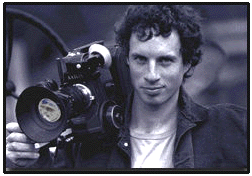
On Fargo, Working With SAG, and The Local Life
Written by Adam Graham | Posted by: Anonymous
John: We shot it this fall. It’s about the conflict between natives and newcomers. It’s part mystery, part love story, and part comedy. It’s interesting because it’s not the broad comedy that Man With A Plan is, and it’s not a thriller mystery, or a traditional love story either, but it has the elements of all of those. It’s another one of those movies that’s hard to put your finger on, and I don’t know what it will turn out like until I go to edit, because since I don’t use screenplays, I have a lot of options. In fact, it’s sort of like I’m just sitting down to write it now that I’m starting to edit the film. But anyway, it’s the story of these three town listers, [an elected position similar to property tax assessors], who are introduced to a couple who have just moved up from Connecticut. The couple, a doctor in his late 50’s and his semi-trophy second wife have moved into town and just bought and rebuilt a mansion. The listers, one in particular played by George Lightford notices a bunch of odd items in the house, including strange photographs and whatnot, and begins to think that these people are leading a lifestyle that he’s not in favor of or doesn’t approve of. But he doesn’t have any substantial proof so he begins to think up ways to get back to the house. In the meantime, the couple becomes so enamored with him because he is sort of a curmudgeonly, charismatic old character that eventually they hire him as the handy man, which sort of fits both of their agendas: the flatlanders wanting to get their foot in the door of the community and him trying to figure out if they’re creeps or not. And so the story takes off from there.
A: Sounds great. Your films seem to all have a certain Vermont angle to them, is that an integral part of your filmmaking, including your future films?
John: Well, I did have to make this Tunbridge Trilogy. Tunbridge is my hometown, and is where Vermont is for Lovers, Man With a Plan and Nosey Parker were all shot, and take place.
A: So after this project do you think you’ll stay with the Vermont theme?
J: More or less I plan to keep making films in Vermont. Probably not so much in Tunbridge and not with my neighbors. In my next film, I suspect that I’ll write even more using screenplays since I haven’t really been using traditional screenplays, which explains why there is so much improvisation. And I suppose I’ll use more professional actors also, instead of using neighbors.
A: So Man With a Plan wasn’t scripted? Was it storyboarded?
J: No. No, I don’t storyboard and I don’t really script in advance. What I do is write a story outline and a scene by scene breakdown, and that’s how I know what I want to get out of the scene. I consider every scene a mini-movie, with a beginning, middle end. In fact most of the scenes break down to something like an interviewer and an interviewee.
A: Does your latest film have a bigger budget than Man With A Plan?
J: Yes, and I actually had a crew of ten people, I wasn’t the camera man and we used SAG actors for the first time.
A: What was it like working with SAG actors? Has working with them created any extra bureaucracy in your own filmmaking process?
J: Oh, it was a total pain working with SAG. I mean they were really nice out of Boston, I guess it’s a completely different story in New York, but just the same it’s odd for me working on low budget indie films and working with SAG actors who need twelve hour breaks and who can only work so many hours a day, and have strict times when they can eat meals, and it just goes on and on.
A: Do most of the actors stick to the SAG rules and regulations?
J: It depends, ours were pretty good. I’ve heard extreme stories in both directions. One story is that someone came into a theater production a friend of mine was doing and said forget all this SAG bullshit, lets get down to work and concentrate on acting. More or less he set the tone and everyone followed. Whereas the play before, the SAG actors constantly had their agents calling wanting hotel upgrades, and overtime, and it just killed her, and made it a nightmare working together as a group.
A: You’d think the actors would realize that coming to Vermont to do a shoot might not be necessarily be what they’re used to in New York or LA.
J: Well, actors struggle for so long and once they join SAG and make it, they’re not about to cut any corners. From the actor’s point of view, all of sudden it sounds nice when you hear SAG say you have to fly our actor first class. Many of the actors have the attitude of "I’ve waited tables for eight years. I deserve this." That’s sort of what you run into. And there is not necessarily a connection between that and their talent. So I don’t think that there are any generalizations, except that SAG is a pain in the butt to work with.
A: Vermont was the first state to abolish slavery, the first to recognize both genders in its constitution, and to this day has the only self-proclaimed socialist [independent] congressman in the House of Reps. Why do you think Vermont has traditionally been so politically different from other states?
J: That’s tough because it’s sort of an ongoing question. Historically the people who have lived here are more independent than New Hampshirites and New Yorkers. I suppose there is just a long tradition of independence here and perhaps it affects a little bit of everything we do.
A. Were you and your family raised in Vermont, and if so how did local politics affect your family life growing up, and affect you as a filmmaker today?
J: No, my dad is from Framingham, Massachusetts and my mom is from Brooklyn, but my father went to Dartmouth and bought the farm here after he got out of college. Then, he went away and fought in World War II and eventually came back. My father was always involved in local politics. He was on the state board of education, then was a state senator for Orange County, and eventually ran for governor in ’76, so he’s always been involved in Vermont politics. So we sort of spent our childhood door-to-door campaigning, or protesting Republican fundraising. We were always pretty active in some sort of radical politics in the early 70’s in Vermont.
A. What misconceptions do you think people have about our state, and how do you think your filmmaking, or local filmmaking in general affects, those conceptions?
J: I suppose people may to some extent still think it’s a pretty provincial and backwards state, and I suppose these movies may do something to change that perception, just in that the people are fairly funny and articulate. Certainly in the movie we are not making caricatures out of the locals, which is pretty rare for movies about rural America.
A: The movie Fargo comes to mind. Were you ever criticized for depicting Vermonters in a way that one might argue the Coen Brothers depicted North Midwesterners?
J: Twice I’ve heard theater owners say that someone came out of Man With A Plan and complained that the movie was making fun of Vermonters. In both cases, the theatre owners asked the people where they were from and they weren’t from Vermont. Thirty thousand Vermonters have seen the film and 24,000 have bought the video, so to that extent I think that’s partly the charm of the movie, in that it turns the table on the traditional local yokel caricatures.
A: In Vermont there has long been a strong fusion between politics and art, do you think the two belong together? How do they affect each other?
J: In Man With a Plan I was trying to actually balance it and not make it as political a movie as something like Bob Roberts or Wag The Dog. It’s not really a true political farce. It was much more a throwback to American silent comedies, where the main character is just an underdog who beats the system. And so in that case, it’s quite non-partisan. Also the politics in Man With a Plan were more of a disgust with the system as a whole regarding what’s happening in Washington, even more so now. I think that some of its appeal is that it doesn’t have an axe to grind or isn’t propaganda. It’s much more about making fun of politics in general.
 A: Man With A Plan, Fred Tuttle plays an old Vermont Farmer who is suddenly elected to US Congress. Do you think that this could ever really happen here?
A: Man With A Plan, Fred Tuttle plays an old Vermont Farmer who is suddenly elected to US Congress. Do you think that this could ever really happen here?
J: I think so because with the media now, name recognition has become the number one factor in determining who will win. Someone like Fred has enormous recognition in Vermont. I don’t think he’d upset Bernie Sanders, or Pat Leahy or Jeffords, but if he ran for something like Lieutenant Governor, and threw in something to indicate his seriousness than he’d have a real chance.
A: Americans have an ever increasing distrust for politicians and are beginning to lose faith in many of them. Why is Fred Tuttle, or someone like him so appealing as a representative?
J: Well I think especially now with what’s going on with Clinton, Tuttle is just the opposite. He’d be a guy who if he was in Clinton’s shoes would say "Yes. In fact I did have dalliances in the Oval Office." What’s missing in politics is that sort of honesty and a willingness to take responsibility for your actions. There’s this big billboard down in Cambridge that reads "Winston Churchhill said with greatness comes responsibility." I think that’s something that the movie is after. Fred doesn’t mind telling it like it is, even to the extent that he’s admitting to greed or wishful greed.
A: He would probably boast about his dalliances in the Oval Office. Getting back to the Fargo comparison, did you ever feel as though you crossed the line between laughing with Tuttle and laughing at him?
J: I don’t think so in Man with A Plan. There was an instance when shooting Nosey Parker, I was driving around with George Lightford who is the star in Nosey Parker and a friend and we ran into this guy in Chelsea, Vermont who George just started talking to. He was just sitting outside his house, and he started talking back and the guy was just completely unintelligible. He just wasn’t quite right in the head. He began speaking in this bizarre kind of Vermont accent, that was really kind of exaggerated and he had no teeth to boot. So it was this amazing scene where George had talked to him enough to where he could decipher his words, but for even someone like me who can understand Fred completely when other people cannot, I had no clue what was being said, and I thought "Oh this would be a funny scene to shoot and put subtitles in." But while it would be a big joke, at the same time it would be exploiting this poor guy and his situation, so I restrained myself and we didn’t shoot it. And that’s the kind of thing I hope I catch before I get a joke off at the expense of the locals.
A: I suppose there’s a very fine line between humor and exploitation.
J: Yes there is, it’s very easy to make a joke that often times turns on people and exploits them.
A: It seems like we must be extra-sensitive nowadays when making comedies. It’s quite a contrast to the old silents where everything was up for grabs in terms of what we allowed ourselves to laugh at.
J: But what’s so great about the Chaplins and Keatons is that they really are doing enough dumb things themselves throughout the movies so that they become this "every man." And so in some way we’ll laugh at their pratfalls, but we’re really laughing at ourselves.
A. How has the publicity changed Fred’s life? Has it changed him at all?
J: Well I think it has, but in a lot of ways he hasn’t changed at all. I don’t think you could find a better person for this to happen to. He’s got this really great egalitarian, democratic attitude about people. Even though now that he’s become a star and he knows it, he is completely undiscriminating as far as who he’ll talk to or who he’ll hang out with. Somehow he projects that he is completely available. I mean I’d be way too intimidated to go up to Tom Crusie or Arnold Schwartzaneger, but with Fred he projects that he wants you to come up and talk with him. Imagine that you were just sitting down and Tom Cruise walked by and just stuck out his hand and said "Hi there fella," and just broke the ice and started talking to you. That’s what so surprising about Fred is that he is so garrulous that he breaks down all those star barriers.
A: Do you think it’s a generational thing or just his own outlook.
J: I think it’s just him. He really disputes the old thing about Vermonters being passive and quiet. Some Vermonters say 10 words a year and other Vermonters [the category] which Fred falls into, never shut up.
For more information visit www.spreadfred.com.










